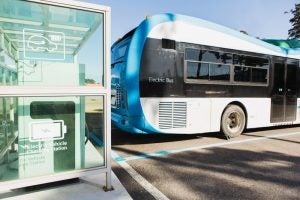 Last month Houston Metro voted to shift to purchasing only zero-emission buses by 2030 — the same year the U.N.’s Intergovernmental Panel on Climate Change has set as a deadline to cut the world’s emissions in half. Both decisions are driven by the same goal: a healthier, safer and cleaner world for our kids. As the largest transit authority in Texas, with one of the nation’s largest fleets, Metro’s bold decision is to be applauded.
Last month Houston Metro voted to shift to purchasing only zero-emission buses by 2030 — the same year the U.N.’s Intergovernmental Panel on Climate Change has set as a deadline to cut the world’s emissions in half. Both decisions are driven by the same goal: a healthier, safer and cleaner world for our kids. As the largest transit authority in Texas, with one of the nation’s largest fleets, Metro’s bold decision is to be applauded.
The move to procure a zero-emission fleet is a necessary one in the self-proclaimed “energy capital of the world,” which has dealt annually with the harm from a warming climate and extreme weather events — the unprecedented flooding of Hurricane Harvey and the fatal crippling of the unprepared power grid by the hard winter storm. In the face of a hotter world, we cannot just turn our air-conditioners up.
In Houston, as in many cities, we know these harms are not experienced in the same way from neighborhood to neighborhood. Communities that have been denied investments in infrastructure to protect against flooding have also been passed over for the placement of supermarkets and retail stores to buy emergency supplies and generators. At the same time, diesel emissions from buses, heavy-duty trucks and other equipment harm Black, Hispanic, Asian and lower-wealth communities disproportionately. These Texans are more likely to live near industrial facilities, ports or roadways where diesel emissions are higher and more persistent.
Houston Metro and Mayor Turner show climate leadership with fleet electrification commitment Share on XCities must start somewhere, and they must go everywhere they can. The largest source in Houston of climate-changing emissions — nearly half of them — is transportation, a figure that casts a shadow over the state’s plans to widen and expand a freeway through the heart of the city. Metro’s decision offers hope. Just two years after they asked voters to approve a $3.5 billion bond to dramatically expand transit service, the agency has committed to electrifying their fleet of more than 1,200 buses. Not only will the city’s transit get better, now it will get cleaner too. This resolution complements Mayor Turner’s Climate Action Plan for the city, implemented last spring. That plan set a goal for the city to meet carbon neutrality by 2050, and as a first step committed to power all municipal buildings with renewable energy and make the city’s own vehicles all-electric by 2030.
Electrifying heavy-duty vehicles like buses is crucial for slashing climate and health emissions from transportation, all while reducing costs. Electrification of diesel trucks and buses is the most cost-effective way to reduce harmful ozone and smog pollutants from the transportation sector. The switch to electric buses will not only address the tailpipe emissions that lead to poor air quality in communities, it will also dramatically decrease the lifecycle greenhouse gas emissions of Metro’s buses.
As a fossil-fuel center, Houston faces a challenge amid the energy transition. This urgent commitment must inspire all other decision-makers – and not only in Houston — to take similar climate action in pursuit of climate justice, a priority repeated across agencies throughout President Biden’s administration. Recent ridership data show that the majority of Houstonians who use Metro are Black or Hispanic; nearly 19% make less than $16,000 a year. Though electrifying the fleet will help reduce the city’s emissions, most riders will still be taking buses home into communities that need to be prioritized with more resources, policies and investments.
Houston’s action demonstrates the leadership needed to meet the moment to deliver safer climate, healthier air and smarter cities. Mayors are especially suited to marshal resources and direct departments to take similarly urgent action, as Mayor Turner has done. Leaders in Houston are listening, and the time is ripe for organizations, grassroots groups and other community organizers with ideas to come to the table. The conversation must go bigger, so every decision leads us forward. There’s no time to waste.









